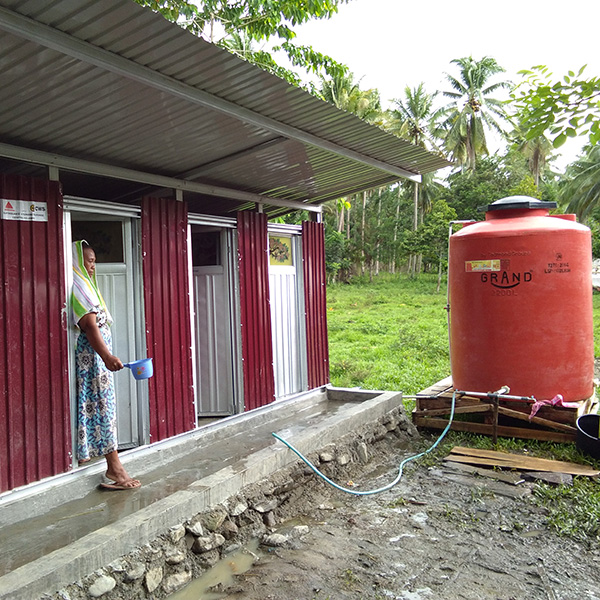Stories of Change

Sanuba exits one of the latrines constructed with CWS support.
Sanitary bathrooms and clean water for survivors in Central Sulawesi, Indonesia
“Before there were latrines in the camp, we defecated in the river, and often we [the women] had to wait because there were always men in the river and we felt insecure and uncomfortable.”
This statement comes from Sanuba, who moved to an evacuation camp in Donggala, Central Sulawesi, Indonesia, after the earthquake in September that devastated the region. It’s not just Sanuba, though – any one of hundreds of women in her situation could have said the same thing. Getting sanitary bathrooms into temporary camps after a disaster is a significant challenge.
The river Sanuba was talking about was about 300 meters (a little less than a quarter mile) from the camp. It’s far enough away that it can be hard for some people to reach, especially at night. “After it rains, the river usually floods. That makes it even more difficult to use,” Sanuba told us. “We were also scared of animals and snakes.”
One of the largest components of the CWS relief effort in Central Sulawesi is WASH, which stands for Water, Sanitation and Hygiene. CWS is working to organize skilled workers and buy high-quality materials to build safe, sanitary latrines and bathing facilities. Our team has constructed or is in the process of building more than 25 public bathroom facilities in camps in Donggala or nearby Sigi district. In December, as we were working with residents of one camp to build latrines and bathing areas, we heard, “I am grateful to CWS for providing basic materials, and a water tank, so we can build latrines and store clean water.”
Just as people were using filthy river water for bathing and relieving themselves, they were also using the water for other purposes. That’s why CWS has a fleet of trucks delivering clean water to about 13,000 people every day.
As relief and early recovery work continue for tens of thousands of people across Central Sulawesi, Sanuba and her family have been able to return to their land to plant corn, chili and a few other vegetables. They are farmers, and their camp isn’t far from their land. Since their house is gone, though, they continue to live in the camp and appreciate having safe, sanitary bathrooms to use.
The earthquake brought the region’s economy and countless families’ lives to an immediate standstill a few months ago. But now, several months later, people are overcoming their shock and dealing more each day with the devastation. Sanuba, and others like her, are moving slowly but sure to rebuild their lives and livelihoods, though it will take years, everyone knows, to return to the old normal. So, for now, Sanuba and others are creating a new normal and trying to get by – with a little help from their friends, like CWS, other ACT Alliance members and other government and non-government agencies.
